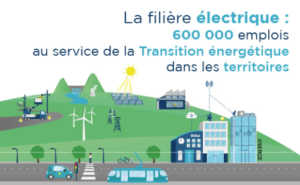In France, EuropeOn members FFIE and SERCE have partnered with the Ministries of Labour and Environment, with the support of the consultant PwC and many actors of the French electricity value chain to highlight the contributions and potential of their professionals in recovery and climate efforts.
With the need for a sound and sustainable economic recovery strategy, that contributes decisively to the EU’s most pressing challenge brought on by climate change, the right measures should provide for a green, just, and competitive growth.
Electrical contractors are at the forefront of the energy transition as the human capital behind electrification. As a skilled workforce, and a central node in the electricity and construction value chains, they are critical to decarbonisation efforts. Electrical contractors are local actors that bring added value to the community and enable consumers to take part in the energy transition as well as the digital transformation.
However, the availability of operatives with appropriate skills is still limited for an ever-growing sector that will be highly solicited as the energy transition unfolds. Economic stimulus package must contribute to reinforce this sector in view of a successful and green recovery, that contributes to Europe’s societal challenges.
In cooperation with the Labour Ministry and the Ministry for the Ecological Transition and with the support of PwC, they have engaged in a comprehensive and unprecedented mapping of jobs and skills in the value chain. This study is meant for enterprises trainees and institutional actors and allowed for a focus on experiments from the Provence-Alpes-Côte d’Azur, Bretagne and Hauts-de-France regions. As the cornerstone of digital and energy transitions, the electricity sector will undergo significant changes by 2030 such as the increase in renewables in the energy mix or the uptake of sustainable and smart buildings, electro-mobility and smart cities.
Achieving the national 2030 targets stands to create over 200.000 jobs in the next ten years, with 80.000 in energy renovation of buildings and 60.000 in renewables. The electricity sector already provides 600.000 jobs, among which half are in electricity systems (generation, transmission, distribution and supply), 220.000 in the building sector, 40.000 in industry and 40.000 in public infrastructure. These jobs are spread across 30.000 companies, ranging from multinationals to independent workers, with a 40% share of SMEs.
These transformations will spawn major economic benefits across the country and its economy, in activities ranging from production and distribution of electricity, to the design and production of electrical equipment and public and private works on buildings and infrastructure. The energy transition is impacting current skills and jobs. As a consequence, all stakeholders will have to make a collective investment effort to adapt vocational training and lifelong learning opportunities by considering the relevant occupational branches together. Providing for sustainable and long-lasting career paths means providing for transversal mobility within the energy sector and at national and regional level.
The final results of the study will be published by the end of September and will be the starting point of an action plan, so stay tuned for a more detailed insight into the French electricity sector’s workforce.

